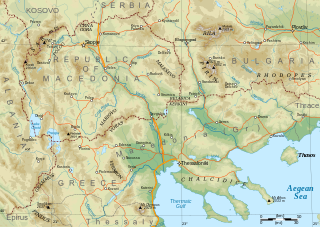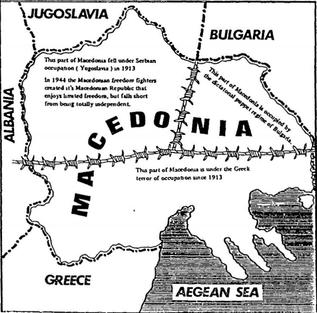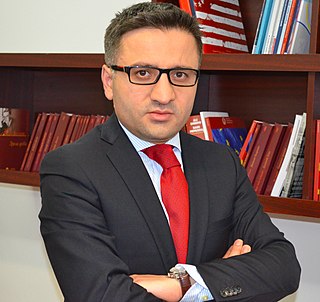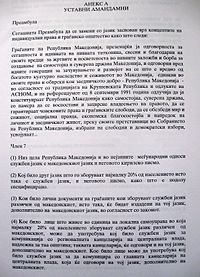Provisions
The Ohrid Agreement created a framework for North Macedonia as a civic state, ending the armed conflict between the National Liberation Army and the security forces of Macedonia. [3] It established basic principles of the state such as cessation of hostilities, voluntary disarmament of ethnic Albanian armed groups, government devolution, and the reform of minority political and cultural rights. [4]
The deal also included provisions for altering the official languages of the country, with any language spoken by more than 20% of the population becoming co-official with the Macedonian language at the municipal level. [4] Only the Albanian language, with an approximate 25% of the population being speakers, currently qualifies as a co-official language under this criterion. [5] The Ohrid Framework Agreement is an example of the adoption of consociationalism. [6]
According to the document, the English-language version is the only authentic version of the Ohrid Framework Agreement. The Government of Macedonia had to adapt the Constitution of Macedonia in order to provide the Albanian minority living in Macedonia with fifteen basic rights. The lead negotiator, on the behalf of the European Union, was François Léotard. James W. Pardew represented the United States. [7]

Macedonia is a geographical and historical region of the Balkan Peninsula in Southeast Europe. Its boundaries have changed considerably over time; however, it came to be defined as the modern geographical region by the mid-19th century. Today the region is considered to include parts of six Balkan countries: all of North Macedonia, large parts of Greece and Bulgaria, and smaller parts of Albania, Serbia, and Kosovo. It covers approximately 67,000 square kilometres (25,869 sq mi) and has a population of around five million. Greek Macedonia comprises about half of Macedonia's area and population.
The history of North Macedonia encompasses the history of the territory of the modern state of North Macedonia.

The National Liberation Army, also known as the Macedonian UÇK, was an ethnic Albanian militant militia that operated in the Republic of Macedonia in 2001 and was closely associated with the Kosovo Liberation Army (KLA). Following the 2001 insurgency in Macedonia, it was disarmed through the Ohrid Framework Agreement, which gave greater rights and autonomy to the state's Macedonian Albanians.

The Social Democratic Union of Macedonia is a social-democratic political party, and the main centre-left party in North Macedonia. The party is pro-European.

Macedonians are a nation and a South Slavic ethnic group native to the region of Macedonia in Southeast Europe. They speak Macedonian, a South Slavic language. The large majority of Macedonians identify as Eastern Orthodox Christians, who share a cultural and historical "Orthodox Byzantine–Slavic heritage" with their neighbours. About two-thirds of all ethnic Macedonians live in North Macedonia; there are also communities in a number of other countries.

The region of Macedonia is known to have been inhabited since Paleolithic times.
The Ashkali, otherwise known as Hashkali and/or Balkan Egyptians, are Albanian-speaking Muslim ethnic cultural minorities, which mainly inhabit Kosovo and southern Serbia, as well as Albania, Montenegro, and North Macedonia. Prior to the Kosovo War of 1999, the Balkan Egyptians or Ashkali people registered themselves as Albanians. While some Ashkali speak Romani, Egyptians usually do not. The two groups are not clearly delineated. Though they differ linguistically and culturally from the Roma, they have often been grouped together under the acronym RAE.
Albanians in North Macedonia are ethnic Albanians who constitute the second largest ethnic group in North Macedonia, forming 446,245 individuals or 24.3% of the resident population. Of the 2,097,319 total population in the 2021 census, 619,187 or 29.52% are Albanians.
The history of the Macedonian language refers to the developmental periods of current-day Macedonian, an Eastern South Slavic language spoken on the territory of North Macedonia. The Macedonian language developed during the Middle Ages from the Old Church Slavonic, the common language spoken by Slavic people.

North Macedonia is a signatory to the European Convention on Human Rights and the U.N. Geneva Convention relating to the Status of Refugees and Convention against Torture, and the Constitution of North Macedonia guarantees basic human rights to all citizens.

United Macedonia, or Greater Macedonia, is an irredentist concept among Macedonian nationalists that aims to unify the transnational region of Macedonia in Southeastern Europe into a single state that would be dominated by ethnic Macedonians. The proposed capital of such a United Macedonia is the city of Thessaloniki, the capital of Greek Macedonia, which ethnic Macedonians and the Yugoslav leader Josip Broz Tito had planned to incorporate into their own states.

The 2001 insurgency in the Republic of Macedonia was an armed conflict which began when the ethnic Albanian National Liberation Army (NLA) insurgent group, formed from veterans of the Kosovo War and Insurgency in the Preševo Valley, attacked Macedonian security forces at the end of January 2001, and ended with the Ohrid Agreement, signed on 13 August of that same year. There were also claims that the NLA ultimately wished to see Albanian-majority areas secede from the country, though high-ranking members of the group have denied this. The conflict lasted throughout most of the year, although overall casualties remained limited to several dozen individuals on either side, according to sources from both sides of the conflict. With it, the Yugoslav Wars had reached the Republic of Macedonia which had achieved peaceful independence from Yugoslavia in 1991.

The Albanian National Army is an Albanian paramilitary organization which operates in North Macedonia, Serbia and Kosovo. The group opposes the Ohrid Framework Agreement which ended the 2001 insurgency in Macedonia between members of the National Liberation Army and Macedonian security forces.

An autonomy referendum was held in Macedonia on 7 November 2004. Voters were asked whether they approved of overturning the municipal redistricting plans that gave greater autonomy to ethnic Albanians following the Ohrid Agreement that ended the 2001 conflict between ethnic Albanian militants and the predominantly ethnic Macedonian government forces. These had been changed to give ethnic Albanians greater control in districts where they had significant presence and gives local authorities greater control over education, health and development. It also reduced the number of municipalities from 123 to 84.

North Macedonia, officially the Republic of North Macedonia, is a landlocked country in Southeast Europe. It shares land borders with Greece to the south, Albania to the west, Bulgaria to the east, Kosovo to the northwest and Serbia to the north. It constitutes approximately the northern third of the larger geographical region of Macedonia. Skopje, the capital and largest city, is home to a quarter of the country's population of 1.83 million. The majority of the residents are ethnic Macedonians, a South Slavic people. Albanians form a significant minority at around 25%, followed by Turks, Roma, Serbs, Bosniaks, Aromanians and a few other minorities.

Fatmir Besimi is a Macedonian politician and economist of Albanian ethnicity. He currently served for Minister of Finance in North Macedonia, He also served twice as Minister of Economy then Minister of Defence and after that he was Deputy Prime Minister of the Government of the Republic of Macedonia in charge of European Affairs. In 2010 he was selected as one of the top European Ministers in the group of Young Global Leaders by World Economic Forum.
Nansen Dialogue Centre Skopje is an NGO based in Skopje Macedonia which was founded in 2000. It won the 2011 Max van der Stoel Award from the Netherlands and OSCE High Commissioner on National Minorities. Its mission is to support intercultural and interethnic dialogue processes with the aim of contributing to conflict prevention, reconciliation and peace building through program activities, in particular in education.
Albanian nationalism in North Macedonia traces its roots in the wider Albanian nationalist movement which emerged as a response to the Eastern Crisis (1878) and proposed partitioning of Ottoman Albanian inhabited lands in the Balkans among neighbouring countries. During the remainder of the late Ottoman period various disagreements culminated between Albanian nationalists and the Ottoman Empire over socio-cultural rights. The Balkan Wars (1912–13) ending with Ottoman defeat, Serbian and later Yugoslav sovereignty over the area generated an Albanian nationalism that has become distinct to North Macedonia stressing Albanian language, culture and identity within the context of state and sociopolitical rights. Pan-Albanian sentiments are also present and historically have been achieved only once when western Macedonia was united by Italian Axis forces to their protectorate of Albania during the Second World War.
The Karpalak ambush, referred to by Macedonians as the Karpalak massacre, was an attack carried out by the National Liberation Army (NLA) against a convoy of the Army of the Republic of Macedonia (ARM) near the village of Grupčin on 8 August 2001 during the 2001 insurgency in Macedonia. Ten members of the ARM's Military Reserve Force, including two officers, were killed at Karpalak and three others were wounded. The ambush was the single deadliest incident of the conflict. It was speculated that the ambush was carried out in retaliation for a Macedonian police raid in Skopje, the day before in which five NLA insurgents were killed.











